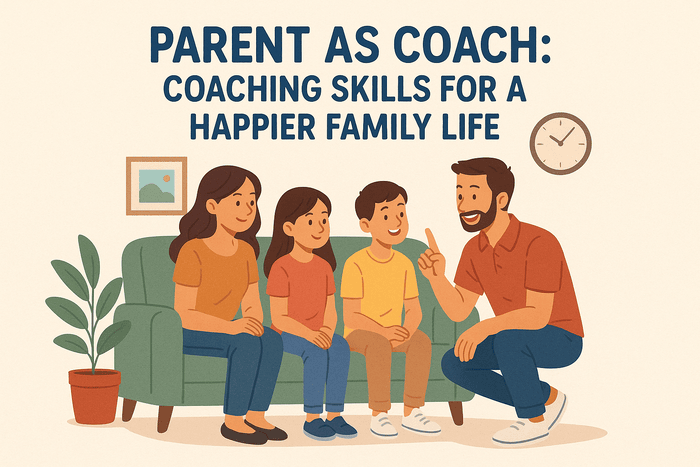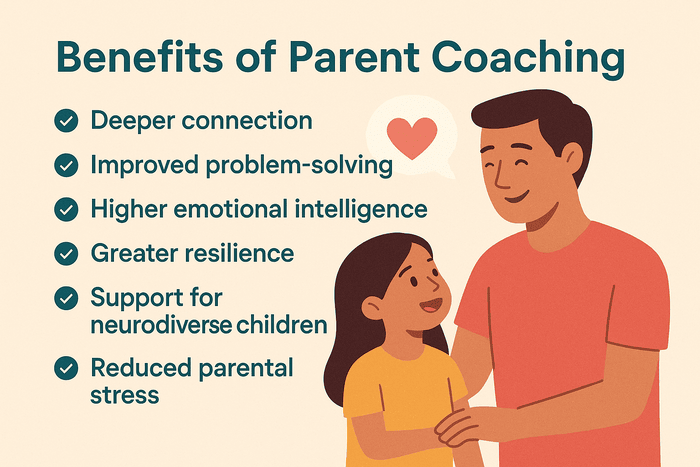
Effective strategic planning and stakeholder management are essential skills for leaders in a rapidly changing business environment. Strategic planning provides...
Parenting in the twenty‑first century has never been more complex or more important. Between the demands of work, the influence of technology and the pressures of competitive schooling, many parents feel overwhelmed. Traditional parenting models—grounded in hierarchy, control and “because I said so”—often fall short in a world that values autonomy, emotional intelligence and collaboration. In response, a growing movement encourages parents to adopt coaching skills. The idea of a parent as coach may seem novel, but it is rooted in a belief that children thrive when they feel heard, empowered and supported. This in‑depth guide explores why coaching is a game changer for family life, how coaching differs from therapy or mentoring, what skills and techniques parents can adopt and how to cultivate a happier, more resilient home.

Parent coaching has emerged over the past two decades as a response to modern challenges. Families today are more diverse, often blending cultures, languages and parenting styles. Many parents juggle full‑time jobs while raising children, leaving little time to reflect on their parenting approach. Access to endless online advice can be both helpful and overwhelming. As a result, many parents seek personalised guidance to navigate conflicting information and unique family circumstances. Parent coaching is a collaborative process that offers tailored strategies and empathetic support to help parents build connected relationships and make conscious choices . It focuses on practical solutions, such as empathetic listening and clear communication, to strengthen family dynamics . Unlike formulaic parenting programs, coaching meets each family where they are, acknowledging their values, needs and goals.
Parent coaching is not therapy—it doesn’t diagnose psychological disorders or explore deep trauma. It is also distinct from mentoring or consulting, where an expert provides answers based on their experience. Instead, parent coaching is a goal‑oriented partnership that empowers parents to find their own answers. Paperbell describes parent coaching as “evidence‑based strategies, personalised guidance and consistent support” aimed at helping families thrive . Coaches facilitate reflection, accountability and growth by asking powerful questions, offering tools and celebrating progress. Heartwise emphasises that parent coaching provides tailored guidance, helping parents develop unique strategies that align with their family’s strengths and challenges .
Understanding these distinctions helps parents choose the right support. Many families combine multiple resources: a therapist for mental health, a mentor for specific tips and a coach for goal‑directed growth and communication.
Adopting a coaching mindset begins with core principles grounded in respect, empathy and collaboration. The following skills can transform everyday parenting moments into opportunities for growth:
Active listening is more than hearing words; it involves paying attention to tone, body language and underlying emotions. Coaches often mirror back what they hear to confirm understanding. Parents who listen actively communicate to their children: “You matter and your feelings are valid.” Heartwise notes that empathetic listening helps parents build connected relationships and understand unique needs . When children feel understood, they are more likely to cooperate and express themselves.
Coaches use open‑ended questions to spark reflection and ownership. Instead of telling a child what to do, a parent coach might ask, “What are some ways we could solve this problem together?” or “How did you feel when that happened?” Powerful questions help children develop critical thinking and problem‑solving skills. They also model curiosity and respect for the child’s perspective.
Coaching draws attention to what’s working rather than dwelling on deficits. Parents can highlight their child’s strengths (“You’re so thoughtful with your friends; how can we use that to help your brother?”) and encourage self‑efficacy. Celebrating small wins reinforces positive behaviour and fosters resilience. This strengths‑based approach aligns with evidence showing that positive reinforcement builds neural pathways more effectively than punishment or criticism.
Parent coaching emphasises what families want to create rather than what they want to avoid. Instead of saying “Don’t be lazy,” parents might say, “Let’s design a homework routine that helps you stay focused.” By focusing on solutions and future outcomes, parents avoid shaming and invite collaboration. This orientation reduces defensiveness and taps into the brain’s reward system, which releases dopamine when small goals are achieved .
Parents serve as the emotional barometers of the household. Being attuned to one’s own feelings and modelling healthy regulation teaches children how to manage their emotions. Techniques like mindful breathing, labeling emotions (“I’m feeling frustrated because…”) and using a Feelings Wheel—a tool Heartwise recommends for neurodiverse families —help children expand their emotional vocabulary. Recognising and validating emotions also defuses tantrums and fosters trust.
Parent coaches believe that abilities and behaviours can change. Encouraging a growth mindset (“You haven’t mastered this yet” instead of “You’re bad at this”) motivates children to keep trying. Carol Dweck’s research shows that praising effort rather than innate talent leads to higher resilience and achievement. Parents can model growth mindset by sharing their own learning journeys and inviting children to set incremental goals.
While coaching is supportive, it is not permissive. Clear boundaries provide safety and consistency. Parents can collaboratively set expectations (“We agree that we’ll all put our phones away at dinner”) and follow through. Accountability applies to parents too—admitting mistakes and making repairs teaches children responsibility and humility.

Parent coaching offers a host of benefits that ripple across the family system. According to Heartwise, parent coaching reduces family conflict, improves communication, fosters emotional intelligence and supports neurodiverse families with tailored strategies . The Old Towne Counseling Center lists similar benefits: improving conflict resolution skills, enhancing parenting skills, understanding child development, building positive relationships, empowering parents and providing personalised support . Paperbell notes that parent coaching helps parents manage behavioral issues, navigate transitions, improve communication, support new parents, balance work and family responsibilities, and address developmental needs like ADHD and autism . These benefits translate into tangible outcomes:
Family dynamics—the patterns of interaction among members—are profoundly influenced by communication styles, power structures and emotional climate. Coaching skills reshape these dynamics in the following ways:
Children thrive on predictability. Establishing consistent routines (morning rituals, homework time, family meals) provides a sense of security. Coaching supports routines by involving children in their creation. For instance, a family meeting may produce a shared schedule where everyone’s needs are considered. This collaborative process fosters ownership and reduces resistance. For neurodiverse children, structured routines are particularly important .
Coaching approaches boundaries as agreements rather than authoritarian rules. Parents and children discuss why a boundary exists and what happens if it’s crossed. Consequences are logical and fair (e.g., if a child doesn’t put toys away, they lose access to those toys for a day) rather than punitive. This encourages children to see boundaries as safeguards rather than control mechanisms.
Problems become opportunities for shared creativity. When siblings fight, a parent‑coach guides them to express feelings, identify needs and brainstorm solutions. The parent remains neutral, facilitating rather than dictating. This method teaches negotiation, empathy and compromise.
Children learn by watching. When parents model respectful disagreement, patience and self‑care, children absorb those behaviours through mirror neurons . Coaching encourages parents to reflect on their own reactions and choose responses aligned with the family’s values. Over time, modelling shapes the household culture.
Families inevitably face transitions and challenges—births, deaths, moves, puberty, exams, illnesses, divorce. Coaching equips parents to navigate these upheavals with grace.
For children with developmental challenges (ADHD, dyslexia, autism spectrum disorder), coaching provides structured routines, sensory‑friendly environments and specific communication techniques like using visual aids or the Feelings Wheel . Paperbell also emphasises supporting parents dealing with adoption, fostering and other transitions . Understanding each child’s needs prevents one‑size‑fits‑all approaches.
Embracing the role of parent‑coach requires intentional shifts in mindset and behaviour. Here is a step‑by‑step framework to begin:
Parents can draw from a toolbox of practical techniques to support their coaching approach. The following table summarises several strategies and when to use them:
Technique | Purpose | Application |
|---|---|---|
Feelings Wheel | Expand emotional vocabulary and identify nuanced feelings | Use during discussions to help children label emotions more accurately; display a wheel at home and refer to it when processing conflicts |
Journaling | Encourage reflection and problem‑solving | Invite children to write or draw about their day; share journals to discuss hopes, fears and gratitude |
Role‑playing | Practice new behaviours and build empathy | Act out challenging scenarios (e.g., asking a teacher for help); switch roles so children experience different perspectives |
Mindfulness exercises | Enhance self‑regulation and presence | Guide your child through deep breathing, progressive muscle relaxation or a five‑sense meditation before homework or bedtime |
Vision board or goal chart | Visualise and track progress toward goals | Create a poster with pictures representing family values or individual aspirations; update it regularly |
GROW model (Goal, Reality, Options, Way forward) | Structure problem‑solving conversations | When a child faces a challenge, ask: What’s your goal? What’s happening now? What options do you have? What will you do next? |
Gratitude practice | Cultivate positive mindset and resilience | At dinner or bedtime, each family member shares three things they’re grateful for; this increases serotonin and strengthens bonds |
Family meetings | Foster collaboration and shared responsibility | Hold weekly meetings to review goals, address concerns and plan enjoyable activities |
Meditation or breathing timer apps | Support mindfulness habits | Use child‑friendly apps that guide short breathing exercises and track streaks to build consistency |
These tools should be adapted to suit the family’s culture, age range and interests. The aim is not to perfect every technique, but to create an environment that encourages experimentation, reflection and connection.
Some parents may choose to work with a professional parent coach for additional guidance. Heartwise suggests identifying your needs, evaluating the coach’s expertise, ensuring a non‑judgmental environment and exploring different coaching styles . Ask potential coaches about their training, approach and experience with issues similar to yours. Observe how you feel in their presence; a good coach should make you feel safe and understood. Paperbell highlights key skills to look for: active listening, strong communication, knowledge of child development, practical strategies, flexibility, problem‑solving and confidentiality .
For those passionate about supporting other families, becoming a parent coach can be a fulfilling career. Many training programs offer certification, often aligned with International Coaching Federation (ICF) competencies. These programs typically cover coaching ethics, child development, family systems theory and practical coaching techniques. Graduates may work independently, join family support services or integrate coaching into education or healthcare roles. Certification ensures coaches meet professional standards and provides credibility when marketing services.
Priya is a mother of two who dreads school mornings. Her sons constantly forget to pack their bags, and everyone leaves the house angry. Working with a parent coach, Priya clarified her value of “calm mornings” and co‑created a routine with her sons. They designed a checklist, practiced packing the night before and agreed on a morning music playlist. Priya learned to ask coaching questions instead of nagging (“What do you need to be ready?”). After several weeks, mornings were smoother, and the boys took pride in getting ready independently.
Rajat’s six‑year‑old daughter Maya has ADHD. Tantrums over transitions left the whole family exhausted. A parent coach introduced the Feelings Wheel and visual schedules. Together, they practised short breathing exercises and used a timer to signal transitions. Rajat learned to validate Maya’s emotions and help her recognise physical cues. Over time, tantrums decreased, and Maya felt more in control. Rajat reported feeling less stressed and more connected .
When Ananya and Sunil decided to separate, they worried about their ten‑year‑old son Kabir. A parent coach helped them create a unified co‑parenting plan, focusing on consistency and open communication. They scheduled weekly calls to discuss Kabir’s needs and attended joint coaching sessions to navigate new boundaries. The coach encouraged them to listen to Kabir’s feelings and answer his questions honestly. Although the divorce was painful, Kabir felt secure knowing his parents were working together.
Implementing coaching skills is not always easy. Common barriers include:
Recognising and addressing these obstacles is part of the growth process. Coaching emphasises progress over perfection.
The ultimate goal of parent coaching is to cultivate resilient, empathetic and empowered human beings. Over time, families that embrace coaching skills often experience:
Heartwise concludes that parent coaching fosters sustainable change, resilience and secure attachments . These outcomes extend well beyond specific parenting challenges; they shape who children become as partners, parents and citizens.
Parenting is often described as the hardest and most rewarding job in the world. By embracing a coaching mindset, parents can turn everyday interactions into opportunities for growth, connection and joy. Coaching is not a magic formula; it is a commitment to being present, listening deeply, asking thoughtful questions and believing in your child’s potential. It respects each family’s unique values and embraces differences. Whether you’re dealing with tantrums, navigating adolescence or supporting a neurodiverse child, coaching skills empower you to respond with curiosity and care. As you experiment with active listening, solution‑focused questions, mindfulness and collaboration, you will likely notice not only improved behaviours but also a deeper sense of love and harmony in your home. And in modelling this approach, you equip your children with the tools they need to thrive in a complex world. Parenting as coaching is an invitation to grow alongside your children—transforming your home into a place where everyone can flourish.
One of the strengths of coaching is its flexibility across cultures. Families differ in their values, communication styles, spiritual beliefs and traditions. A coaching approach honours these differences by starting with the family’s narrative rather than imposing a universal framework. In collectivist cultures where respect for elders is paramount, coaching can be framed around collaborative respect: children’s voices are welcomed while elders’ wisdom guides decisions. In cultures that emphasise independence, coaching may focus on creating safe boundaries while nurturing self‑reliance. Language differences can become learning opportunities; using coaching questions in one’s mother tongue deepens resonance. Coaches and parents should be mindful of cultural biases within coaching literature, adapting techniques to fit local contexts. Inclusivity also extends to non‑traditional families: single parents, LGBTQ+ parents, blended households and caregivers raising nieces, nephews or grandchildren. Coaching skills can empower any caregiver to foster healthy relationships, regardless of family structure.
Finally, it’s worth noting that the principles of parent coaching have roots in neuroscience and psychology. The brain’s reward circuits respond positively to supportive interaction, reinforcing desired behaviours and emotional regulation . Practices like mindfulness and deep breathing activate the parasympathetic nervous system, calming stress responses and making learning more accessible . Mirror neurons mean that children literally “catch” our emotional states ; by cultivating calm, parents help their children develop calm. Yet science alone cannot capture the essence of parenting. Love—the unconditional care and willingness to sacrifice for a child—underpins every technique. Coaching provides tools, but love provides the motivation. When science and love meet, they create a powerful synergy: evidence‑based strategies applied with warmth, creativity and humour.
As you embark on or continue your coaching journey, remember that small changes compound over time. A single question asked with curiosity can shift a child’s perspective; a brief pause before reacting can change the tone of an entire evening. There will be setbacks and imperfect moments, but these are invitations to reconnect, repair and learn together. By committing to growth and compassion, parents lay a foundation for lifelong well‑being—both for themselves and for the children they cherish. Coaching is not a destination but an ongoing practice of being fully present, adapting and loving fiercely.
Parent coaching is a goal-oriented partnership that empowers parents to find solutions using evidence-based strategies, focusing on present and future goals. Unlike therapy, it doesn’t address deep trauma or diagnose conditions; unlike mentoring, it avoids prescriptive advice, fostering autonomy through questions and collaboration.
Key skills include active listening to validate emotions, asking powerful questions to spark reflection, adopting a strengths-based perspective, using solution-focused strategies, modeling emotional intelligence, promoting a growth mindset, and setting clear boundaries with accountability.
It fosters deeper connections through trust, improves problem-solving by encouraging collaboration, enhances emotional intelligence, builds resilience for transitions, supports neurodiverse children with tailored strategies, and reduces parental stress by empowering effective responses.
Tools include the Feelings Wheel for emotional literacy, journaling for reflection, role-playing for empathy, mindfulness exercises for self-regulation, vision boards for goals, the GROW model for problem-solving, gratitude practices for positivity, and family meetings for collaboration.
Address time constraints by integrating coaching into daily routines, counter skepticism with evidence and small wins, shift from authoritarian dynamics by offering choices, and manage emotional triggers with self-compassion, professional support, and modeling humility.

Effective strategic planning and stakeholder management are essential skills for leaders in a rapidly changing business environment. Strategic planning provides...

Change Management & Digital Transformation: Build Adaptive Leaders with Erickson Coaching Rapid technological advances, shifting customer expectations and global disruption...

Discover how Erickson’s solution‑focused coaching delivers up to 788 % ROI and drives operational excellence by improving strategic thinking, communication and...

The coaching profession has moved from the margins to the mainstream. Recent global studies show that the number of professional...

India’s economy has transformed dramatically over the last decade, and the demand for top business coach India services has grown...

When searching for a certified life coach program price, it’s natural to start by comparing tuition fees. Aspiring coaches want...

Neuro-Linguistic Programming (NLP) is experiencing a resurgence in India. Social media, workshops and high-energy seminars promise instant breakthroughs by rewiring...

Many professionals pursue the title of Certified Organizational Development Coach with the expectation that a credential alone will open corporate...

Some providers offer to fast-track you to PCC status through purely online modules for a fraction of the cost of...